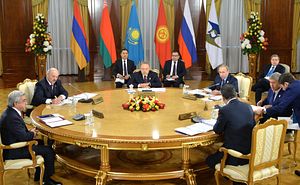For the better part of the past couple years, nearly every sign — social, economic, political — has pointed to the disappointment the Eurasian Economic Union (EEU/EAEU) has brought to bear. Rather than the “epoch-making” grouping Russian President Vladimir Putin pledged, the EEU has resulted in any number of trade wars, fresh frictions, and concerns about Russian regional hegemony. Indeed, the EEU may well be the most disappointing post-Soviet group extant, if only for the promise the organization once held — a promise that Russia effectively torpedoed following its invasion of Ukraine.
Now, a new paper from Chatham House details the myriad ways the EEU has fallen short, and how Moscow flubbed the primary geopolitical project of Putin’s third presidential term. Written by Rilka Dragneva, a reader at the Birmingham Law School, and Kataryna Wolczuk, a professor with the University of Birmingham and associate fellow at Chatham House, the paper threads the numerous mistakes Moscow made on its way to gutting the EEU’s impact and sending traditional allies scampering to keep from getting too close to the Kremlin. Rather than acting as a European Union redux, the EEU, in a phrase often affiliated with other post-Soviet groups, is far closer to an empty shell than an functioning body. As the authors write, “Satisfied with having created a union, Russia is not preoccupied with making it work. … [The] EAEU is failing to live up to the grand narrative and fanfare that helped launch it.”
It’s not especially difficult to trace where the EEU went awry. After all, for an organization that sees Russia account for some 84 percent of total GDP — and which launched just as Moscow entered into the longest recession Putin had ever overseen, with little likelihood of early-2000s growth rate returning — economic disappointment was bound to result. “Except for the case of Kyrgyzstan, there is little evidence to suggest that integrating with Russia is an attractive path towards modernization,” Dragneva and Wolczuk note. Still, the smaller states are willing to at least cater to Russia’s geopolitical designs and claims of regional hegemony, so long as it means more favorable economic relations.”Ultimately, the signing of the new [customs] code in December 2016 became another opportunity for Kyrgyzstan and Belarus to secure better economic hand-outs from Russia,” the authors continue. “Even when the code enters into force, most likely in 2017, this kind of bargaining is likely to plague its implementation within the EAEU.”
Indeed, much like Russia’s carving of Ukraine, the Kremlin has sacrificed strategic gains for tactical success, undercutting Moscow’s — and the region’s — long-term interests for the sake of soundbites and symbolic gains. As the authors note, “the EAEU is nominally about economic cooperation, yet economic relations with Eurasian members only matter for Russia as a precursor to achieving its political and geopolitical aims.” And yet, when Ukraine opted to forego joining the Eurasian Union, Russia’s decision to scour troops through Crimea and the Donbass helped prompt actors like Kazakhstan to stall out Moscow’s push for the Eurasian Union’s common monetary and defense policies — and kneecap Moscow’s efforts to make the Eurasian Union anything more than an economic washout. After all, with declining intra-EEU trade, Dragneva and Wolczuk write that the “evidence contradicts the view that member states, including Russia, are primarily committed to deeper economic integration.”
The paper comes with a further raft of details — on regulations, on tariff adjustments, on labor relations — but, at the crux, Dragneva and Wolczuk identify the tension inherent within the EEU’s internal structures. On the one hand, for Moscow, “Eurasian integration is one of Russia’s key strategies to re-build its status on the international stage.” But on the other, given Moscow’s post-2014 moves, “Russia signalled that it is prepared to undermine the very organization through which it sought to reassert its regional power.”
Again, given all that’s rolled through the post-Soviet space over the past few years, it’s easy to forget just how seminal the Eurasian Union was to have been for Putin’s third term. Indeed, before the Crimean annexation fractured Russia’s relations with the West — and before China’s Silk Road Economic Belt made its inroads — the Eurasian Union was the primary project for reasserting Russia’s regional hegemony. But the dismay coursing the EEU is plain for all to see. And there’s little reason to think such trajectory, given both the current leadership in the Kremlin and the economic realities on hand, will change in the foreseeable future. As Dragneva and Wolczuk conclude, there “is little to inspire confidence that the Eurasian project is capable of delivering on its grand promises.”
































